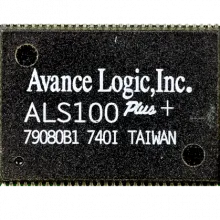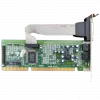
The Avance Logic ALS100+ is an audio chipset and sound card solution that gained prominence in the early days of personal computing. It was released by the Avance Logic company (later acquired by Realtek) and provided audio capabilities for computers during the 1990s. The ALS100+ was known for its compatibility with various DOS and Windows-based systems, making it a popular choice for audio functionality.
Key features of the Avance Logic ALS100 included:
-
16-Bit Audio: The ALS100+ supported 16-bit audio playback and recording, which was a notable improvement over earlier 8-bit sound cards.
-
FM Synthesis: It featured FM synthesis capabilities, allowing it to generate various types of audio effects and music through software-based synthesis.
-
Wavetable Synthesis: Some versions of the ALS100 offered wavetable synthesis, which provided better quality MIDI playback by utilizing pre-recorded samples of real instruments.
-
DOS and Windows Compatibility: The ALS100+ was designed to work with both DOS-based games and Windows applications, making it a versatile solution for users who wanted audio functionality across different software environments.
-
Basic Mixer Controls: The chipset usually came with basic mixer controls that allowed users to adjust volume, balance, and other audio settings.
-
Legacy Connections: The card typically provided connections for MIDI input and output, which was important for connecting external MIDI devices like keyboards.
The ALS100+ was one of several audio solutions available during the early days of personal computing, alongside competitors like Sound Blaster from Creative Technology. It played a role in popularizing audio in PCs, especially for gaming and multimedia purposes. However, as technology advanced, newer and more advanced sound card solutions with improved audio quality and features eventually superseded the ALS100+.
